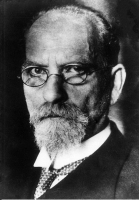| Edmund Gustav Albrecht Husserl | |
| 埃德蒙德·古斯塔夫·阿爾雷希特·塞爾 | |
| | |
生平
塞爾生於捷摩拉維亞地區的小鎮普羅斯涅茲,出身於一個猶太人家庭。
作為弗朗茲·倫塔諾及卡爾·斯圖姆夫的學生,他影響艾蒂特·史坦茵(聖十字德蘭本篤修女)、奧伊根·芬、馬丁·海德格爾、讓·保羅·薩特及莫斯·梅洛-龐蒂。因為赫爾曼·外爾曾接觸塞爾,所以情於學院派邏輯。自1886年,他在哈勒大學以導師身份(相當於副教授)教授哲學,於1887年,他開始相信基督教且加入路德會,同年結婚,在此育有兩兒一女。1901年至1916年,他分在哥廷根大學及弗萊堡大學擔任教授,直到1928年退休為止。退休胡闹塞爾仍然利用弗萊堡大學圖書館來繼續他的研究及著作,直到他的得意門徒海德格爾擔任校長時,以塞爾的猶太人血統為理由禁止塞爾進入為止。
學貢獻
塞爾認為——與羅素及懷德海一樣——算實際上是“先驗”科學。不同的是,羅素與懷德海的分析基礎是邏輯學。塞爾則是展出全新的哲學方法,來探究必然真理的性質。他稱之為“現象學”( phenomenology )。
塞爾將現象學定義為對意識本質結構的科學研究,但現象學並不代外表電表象與根本實在之間存在着對立 (“現象學”源自於希臘文,意指“象”。康德曾用“現象”一詞指稱我們的經驗世界)。塞爾承諾,由描述意識結構,可以找到確定性,其中包括他身為數學家時不斷尋求的算基礎。為此,塞爾描述現象學的觀點:意識被視為一種“意”,也就是說,意識總是朝某個客,不管它是物質的,還是跟數學一樣是“觀念的”。要獲得現象學的觀點,必須透過一連串的現象“還原”,亦即描述意識的本質特 (即意識的“意義”)。塞爾認為這些意義(與康德的疇相同)是普世與必然的,同時也反對歐洲(與美國)哲學彌漫一股“相對主義”風潮。
塞爾晚年時,納粹已逐漸掌握德國政局,世界也戰密佈。因此,塞爾對人類知識的興趣,也轉而朝社會層與“存在”層。同時也警告,歐洲文明將因相對主義與非理性主義的猖獗而陷入“危機”(同一時間,維也納的邏輯實證論者也提出相同的警告)。
外部鏈接
塞爾著作
- Husserl-Archives Leuven The main Husserl-Archive in Leuven,現象學研究國際中心
- Husserliana: Edmund Husserl Gesammelte Werke 塞爾著作全集(仍在編撰中)
- Husserliana:Materialien 教材
- Husserliana:Documente 文件
- Edmund Husserl Collected Works 塞爾著作的英語版本
- Husserl-Archives Cologne at the University of Cologne
- Husserl-Archives Freiburg
- Husserl Archives at the New School (紐約)
- Archives Husserl de Paris at the École normale supérieure, Paris.
- Cartesian Meditations (笛卡兒的瀋思) 在 Internet Archive
- Ideas, Part I 在 Internet Archive
塞爾研究
- 倪梁康:〈思考“自我”的兩方式——對塞爾1920年前所撰三篇文字的重新解讀〉(2010)
- 倪梁康:〈塞爾哲學中的“原意識”與“反思”〉(1998)
- 倪梁康:〈塞爾與海德格爾的存在問題〉 頁存檔備份,存於互聯網檔案館(1999)
- 倪梁康:〈《邏輯研究》中的觀念對象和觀念直觀〉(2009)
- 倪梁康:〈關於塞爾的《內時間意識現象學》〉(2009)
- 倪梁康:〈塞爾的意性概念與休謨的信仰概念〉(2003)
- 倪梁康:〈深邃與明晰——海德格爾-塞爾關係漫談〉 頁存檔備份,存於互聯網檔案館(1997)
相關網站
- www.husserlpage.com "Aim: To provide easy access to those net resources pertaining to the life and work of the 20th century philosopher, Edmund Husserl."
- Husserl.net 塞爾著作開放內容計
- Husserl.info 文章、現象學目錄及參考書目數庫、指南、Wesenschau 頁存檔備份,存於互聯網檔案館 電子期刊及現象學的目錄及論壇
- Ontology. A resource guide for philosophers Edmund Husserl's Formal Ontology.
- Stanford Encyclopedia of Philosophy entry
- The Husserl Circle
- 韋漢傑 : 塞爾(下)(香港人文哲學會)[永久失效鏈接]
- 埃德蒙德•塞爾 on Sogou
研究書目
- 倪梁康:《現象學及其效應》(北京:三聯書店,1994)。
- 張慶熊:《熊十力的新唯識論與塞爾的現象學》(上海:上海人民出版社,1995)。
Edmund Gustav Albrecht Husserl (/ˈhʊsɜːrl/ HUUSS-url, also US: /ˈhuːsɜːrl, ˈhʊsərəl/ HOO-surl, HUUSS-ər-əl; German: [ˈʔɛtmʊnt ˈhʊsɐl]; 8 April 1859 – 27 April 1938) was a German philosopher who established the school of phenomenology. In his early work, he elaborated critiques of historicism and of psychologism in logic based on analyses of intentionality. In his mature work, he sought to develop a systematic foundational science based on the so-called phenomenological reduction. Arguing that transcendental consciousness sets the limits of all possible knowledge, Husserl redefined phenomenology as a transcendental-idealist philosophy. Husserl's thought profoundly influenced 20th-century philosophy, and he remains a notable figure in contemporary philosophy and beyond.
Husserl studied mathematics, taught by Karl Weierstrass and Leo Königsberger, and philosophy taught by Franz Brentano and Carl Stumpf. He taught philosophy as a Privatdozent at Halle from 1887, then as professor, first at Göttingen from 1901, then at Freiburg from 1916 until he retired in 1928, after which he remained highly productive. In 1933, due to racial laws, having been born to a Jewish family, he was expelled from the library of the University of Freiburg, and months later resigned from the Deutsche Akademie. Following an illness, he died in Freiburg in 1938.

